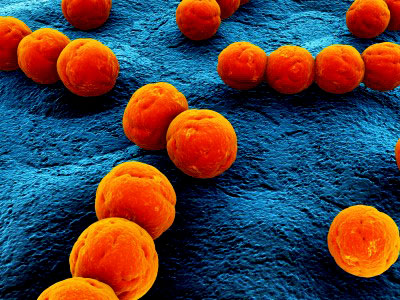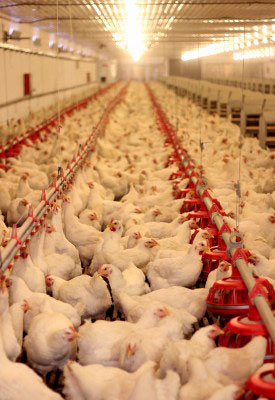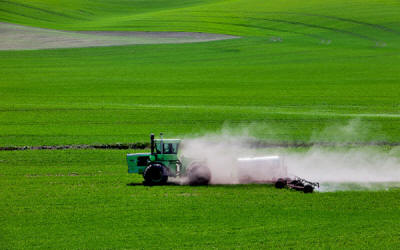Could Monsanto's glyphosate-based herbicide Roundup
be leading to the overgrowth of deadly bacteria in animals and humans
consuming genetically-modified food contaminated with it?

This question follows from a new study published in the journal Current Microbiology titled, "The Effect of Glyphosate on Potential Pathogens and Beneficial Members of Poultry Microbiota In Vitro," which found that the active ingredient in Monsanto's Roundup herbicide, known as glyphosate, negatively impacted the gastrointestinal bacteria of poultry in vitro.
The researchers presented evidence that highly pathogenic bacteria resisted glyphosate, whereas beneficial bacteria were moderately to highly susceptible to it.
Some of the beneficial species that were found to be suppressed by glyphosate were,
Enterococcus faecalis
Enterococcus faecium
Bacillus badius
Bifidobacterium adolescentis
Lactobacillus spp
The pathogenic species which were found to resist glyphosate toxicity were,
Salmonella Entritidis
Salmonella Gallinarum
Salmonella Typhimurium
Clostridium perfringens
Clostridium botulinum
The researchers stated that,
"A reduction of beneficial bacteria in the gastrointestinal tract microbiota by ingestion of glyphosate could disturb the normal gut bacterial community."
Even more alarming was their observation that the toxicity of glyphosate to the most prevalent beneficial species, Enterococcus,
"could be a significant predisposing factor that is associated with the increase in Clostridia botulinum-mediated diseases by suppressing the antagonistic effect of these bacteria on clostridia."
Clostridia are a class of anaerobic bacteria including some of the most dangerous known to man, such as C. tetani and C. botulinum, which produce tetanus and botulin toxin, respectively.
Consider that botulin is the most acutely toxic substance known, and that despite the fact it is FDA-approved for use "cosmetically," e.g. Botox injections, it is being looked at as a potential bioweapon because it only takes 75 billionths of a gram (75 ng) to kill a person weighing 75 kg (165 lbs).
It has been estimated that only 1 kilogram (2.2 lbs) would be enough to kill the entire human population.
The researchers noted that the glyphosate-sensitive beneficial strains of bifodobacteria, lactobacilli, propionibacteria and enterococci were found to inhibit the growth of C.botulinum.
They also found that pathogenic Salmonella and E.coli strains, increasingly found contaminating poultry products, were highly resistant to glyphosate.
Lastly, the researchers pointed out that glyphosate also has the potential to induce genetic mutations within bacteria, making it possible for a new level of pathogenicity to emerge following chronic exposure to this chemical.

What Does This Mean For Our Food?
One of the obvious implications of this research is that poultry fed glyphosate-laced genetically modified corn or soy, for instance, would likely experience unhealthy changes in the make-up of their intestinal flora (known as dysbiosis), resulting in increasing harm not only to the animals, but to those consuming them.
Factory-farmed chickens are already routinely fed antibiotics, arsenic and even antidepressants, all of which represent serious health threats, both by contributing to the generation of communicable disease vectors, as well as contamination of the meat itself.
This new study adds to a growing concern that concentrated animal feeding operation (CAFO) chickens may becoming a breeding ground for botulism, and related pathogenic organisms.
Deadly botulism outbreaks in cattle, in fact, have recently been linked to poultry litter contamination in Ireland. [i]
Also, this month the FDA broadened the use of highly controversial food irradiation by increasing the allowable dose in poultry from 3 to 4.5 Kilograys (keep in mind a Kilogray is equivalent to 2,500,000 chest x-rays - 40 millirems each - or 166 times a human lethal dose - 5 Grays), citing concerns that lower levels do not eliminate radiation-resistant spore-forming bacteria such as Clostridium botulinum. [ii]
More Than Just A Food Contamination Problem
Research published earlier this year, also in the journal Current Microbiology, indicated that glyphosate formulations, at concentrations lower than presently used in agricultural applications, are capable of destroying food organisms widely used as starters in traditional and industrial dairy technologies, such as
Geotrichum candidum
Lactococcus lactis subsp. cremoris
Lactobacillus delbrueckii subsp. Bulgaricus [iii]
The study authors concluded that Roundup herbicide's inherent toxicity to soil organisms may explain what is behind,
"...the loss of microbiodiversity and microbial concentration observed in raw milk for many years."
The reality is that GM farming practices, which are heavily reliant on glyphosate-based herbicide formulations, are creating a more serious long-term threat to our food security by drastically altering the composition of the soil, threatening its very fertility and ability to produce food for present and future generations.
For more details read our article on the topic: Un-Earthed: Is Monsanto's Glyphosate Destroying The Soil?
Resources
[i] BBC, News Northern Ireland, Farmers fear poultry litter may be source of botulism, Nov. 19th, 2012
[ii] FoodQualityNews.com, FDA broadens irradiation use, Dec. 11th, 2012
[iii] Emilie Clair, Laura Linn, Carine Travert, Caroline Amiel, Gilles-Eric Séralini, Jean-Michel Panoff. Effects of Roundup(®) and Glyphosate on Three Food Microorganisms: Geotrichum candidum, Lactococcus lactis subsp. cremoris and Lactobacillus delbrueckii subsp. bulgaricus. Curr Microbiol. 2012 Feb 24. Epub 2012 Feb 24. PMID: 22362186

